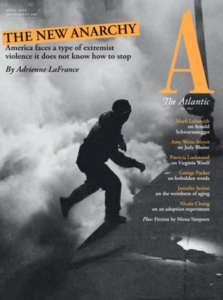THE MORAL CASE AGAINST EQUITY LANGUAGE
What’s a “justice-involved person”?
By George Packer

In the April 2023 issue of The Atlantic is an article by George Packer that was very insightful that oddly did not seem to stir up any debate. The article brings up something that is under the radar in our current society, but on everyone’s minds. The Moral Case Against Equity Language outlines how language today is being regulated by new equity guideline teams. In marketing lingo these guidelines often are a part of what are called style guides. Words have power and the object is to make language more “equitable.” The article explains how these new equity guidelines are used by The Sierra Club, non-profits, corporations, academia and other large organizations to craft their writing. It explains the complicated way that language and words enforce power structures and define identity. How important it is for everyone to “get it right.” It looks at current efforts to equalize and defang language of some of it historical biases and prejudices. Words matter indeed. One cannot help but think of Orwell’s thought police. The article starts out with:
“The sierra club’s Equity Language Guide discourages using the words stand, Americans, blind, and crazy. The first two fail at inclusion, because not everyone can stand and not everyone living in this country is a citizen. The third and fourth, even as figures of speech (“Legislators are blind to climate change”), are insulting to the disabled. The guide also rejects the disabled in favor of people living with disabilities, for the same reason that enslaved person has generally replaced slave : to affirm, by the tenets of what’s called “people-first language,” that “everyone is first and foremost a person, not their disability or other identity.”
The article goes on with
“Although the guides refer to language “evolving,” these changes are a revolution from above. They haven’t emerged organically from the shifting linguistic habits of large numbers of people. They are handed down in communiqués written by obscure “experts” who purport to speak for vaguely defined “communities,” remaining unanswerable to a public that’s being morally coerced.”
That’s the spooky part that is often the elephant in the room these days. Who are these people? The article closes with an argument that the guidelines maybe doing more harm than good. Whether you are “homeless” or “unhoused,” you still do not have a roof over your head. Changing the language does not solve the problem. It really often simply makes people feel less guilty and temporarily more comfortable.
This huge expense of energy to purify language reveals a weakened belief in more material forms of progress. If we don’t know how to end racism, we can at least call it structural. The guides want to make the ugliness of our society disappear by linguistic fiat. Even by their own lights, they do more ill than good—not because of their absurd bans on ordinary words like congresswoman and expat, or the self-torture they require of conscientious users, but because they make it impossible to face squarely the wrongs they want to right, which is the starting point for any change.
Brilliant thinking and something no one dares touch. I am surprised that the article did not stir up more debate. Indeed, “the guides want to make the ugliness of our society disappear by linguistic fiat” is a fair assessment.
Excellent topic. Choice writing. Subscribe to The Atlantic today!
Epilogue
It is important to not confuse the new equity guidelines with other issues of freedom of speech. That someone who commits multiple felonies and then threatens judges and elected officials receives a “gag-order” has absolutely nothing to do with the topic in this article.
And to that point, the writing and thinking of authors from before the equity guidelines, who use “slave” instead of “enslaved person” are no less valid in their works because of this use of language. Furthermore, if authors today use the old nomenclature, it does not invalidate their theories or ideas. A vigorous intellectual pursuit is not meant to be a journey towards making everyone feel comfortable.

